
Vasily Ilyich Safonov, also known as Wassily Safonoff, was a Russian pianist, teacher, conductor and composer.

Rubin Goldmark was an American composer, pianist, and educator. Although in his time he was an often-performed American nationalist composer, his works are seldom played now. Today he is best known as the teacher of other important composers, including Aaron Copland and George Gershwin.

Frederick Stock was a German conductor and composer, most famous for his 37-year tenure as music director of the Chicago Symphony Orchestra.

Anatoly Konstantinovich Lyadov or Liadov was a Russian composer, teacher and conductor.

Clarence Cameron White was an American neoromantic composer and concert violinist. Dramatic works by the composer were his best-known, such as the incidental music for the play Tambour and the opera Ouanga. During the first decades of the twentieth century, White was considered the foremost black violinist. He was a member of Alpha Phi Alpha fraternity.

Joseph Guy Marie Ropartz was a French composer and conductor. His compositions included five symphonies, three violin sonatas, cello sonatas, six string quartets, a piano trio and string trio, stage works, a number of choral works and other music, often alluding to his Breton heritage. Ropartz also published poetry.

Dudley Buck was an American composer, organist, and writer on music. He published several books, most notably the Dictionary of Musical Terms and Influence of the Organ in History, which was published in New York City in 1882.

Leo Salkeld Sowerby, American composer and church musician, was the winner of the Pulitzer Prize for music in 1946, and was often called the “Dean of American church music” in the early to mid 20th century.
Gustav Strube was a German-born conductor and composer. He was the founding conductor of the Baltimore Symphony Orchestra in 1916, and taught at the Peabody Conservatory. He wrote two operas, Ramona, which premiered in 1916, and The Captive, which premiered at the Lyric Theatre in Baltimore in February 1938. He was also a member of Baltimore's famous Saturday Night Club with H. L. Mencken.

Sir John Blackwood McEwen was a Scottish classical composer and educator. He was professor of harmony and composition at the Royal Academy of Music, London, from 1898 to 1924, and principal from 1924 to 1936. He was a prolific composer, but made few efforts to bring his music to the notice of the general public.
The American Conservatory of Music (ACM) was a major American school of music founded in Chicago in 1886 by John James Hattstaedt (1851–1931). The conservatory was incorporated as an Illinois non-profit corporation. It developed the Conservatory Symphony Orchestra and had numerous student recitals. The oldest private degree-granting music school in the Midwestern United States, it was located in Chicago until 1991.

Julianus Marie August De Boeck was a Flemish composer, organist and music pedagogue. He was the son of organist and director Florentinus (Flor) De Boeck (1826-1892)
Mortimer Wilson was an American composer of classical music. He also scored several musical and dramatic films in the 1920s.

Feliks Nowowiejski was a Polish composer, conductor, concert organist, and music teacher. Nowowiejski was born in Wartenburg in Warmia in the Prussian Partition of Poland. He died in Poznań, Poland.

Francisco Santiago was a Filipino musician, sometimes called The Father of Kundiman Art Song.

Paul Gilson was a Belgian musician and composer.
Charles Sanford Skilton was an American composer, teacher and musicologist. Along with Charles Wakefield Cadman, Blair Fairchild, Arthur Nevin, and Arthur Farwell, among others, he was one of the leading Indianist composers of the early twentieth century.

Arthur Finley Nevin was an American composer, conductor, teacher and musicologist. Along with Charles Wakefield Cadman, Blair Fairchild, Charles Sanford Skilton, and Arthur Farwell, among others, he was one of the leading Indianist composers of the early twentieth century.
Arne Oldberg was an American pianist, composer, and teacher. He spent his career on the faculty of Northwestern University (1897–1941), where he taught piano and composition and, from 1924 until his retirement in 1941, served as director of the graduate department of the Music School. Among his students were composers Howard Hanson, Cecilia Clare Bocard, Theodora Troendle, Mildred Lund Tyson, and Ella May Walker.

Louis Plaidy was a celebrated German piano pedagogue and compiler of books of technical music studies.















